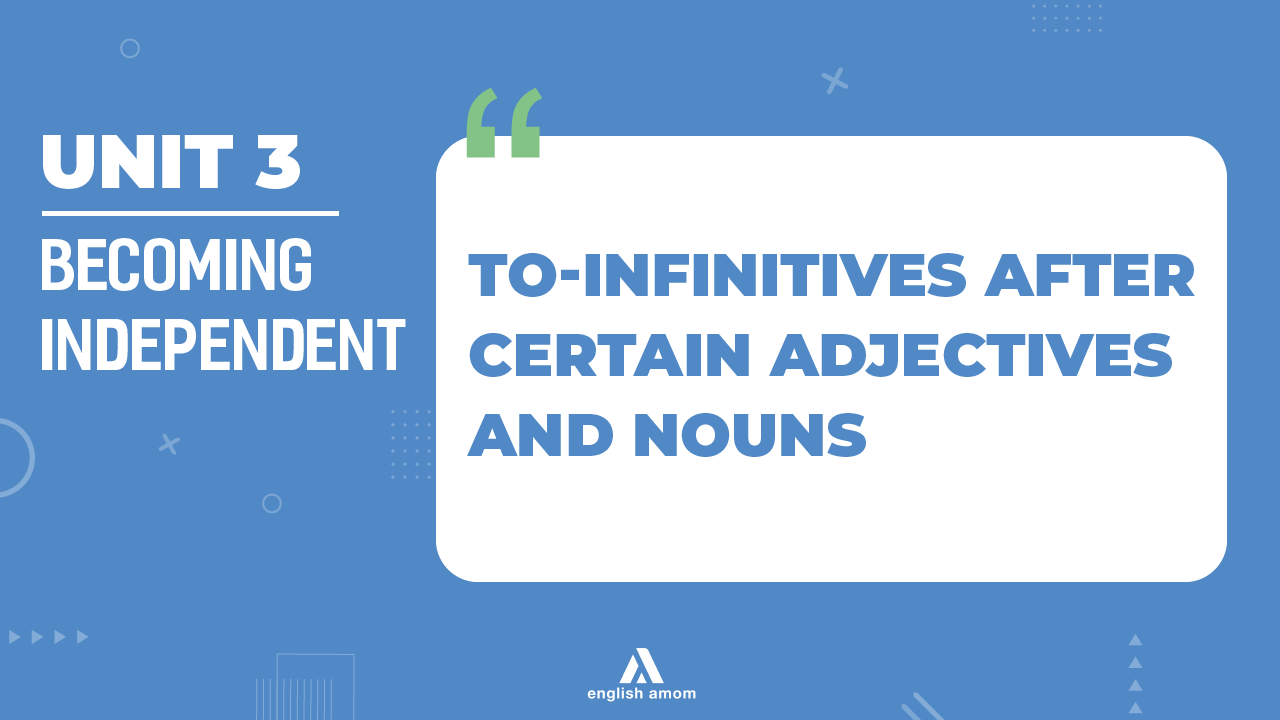
► Kênh hỏi đáp và giải thích thắc mắc kiến thức MIỄN PHÍ → truy cập LINK NHÓM: ENGLISH AMOM
► Kênh YOUTUBE hệ thống toàn bộ bài giảng CLIPS: truy cập LINK: ENGLISH AMOM CHANNEL
► Kênh TIKTOK: ENGLISH AMOM
I) LÝ THUYẾT
1) Chúng ta có thể sử dụng To – V đứng sau tính từ để đưa ra lý do cho tính từ đó.
Noun/pronoun + linking verb + adjectives + to – V
Adjectives: glad, happy, lucky, amazed, surprised, proud, determined, pleased, sorry, disappointed, sad, afraid,...
Ví dụ: I am happy to see my former teacher again. (Tôi rất vui khi gặp lại giáo viên cũ.)
2) Chúng ta có thể sử dụng To – V trong cấu trúc với “It” và tính từ để đưa ra lời nhận xét hoặc đánh giá.
It + linking verb + adjectives (for somebody) + to – V
Adjectives: easy, difficult, hard, interesting, boring, nice, great, good, possible, impossible , likely, important, necessary, unreasonable,...
Ví dụ: It is interesting to talk to him. (Thật thú vị khi nói chuyện với anh ấy.)
3) Chúng ta có thể sử dụng To – V sau những danh từ trừu tượng để nói về những hành động mà những danh từ ấy liên quan tới.
Noun + to – V
Nouns: advice, ability, ambition, anxiety , attempt, chance, decision, dream, failure, permission, chance, plan, request, wish, way , demand, determination, effort, offer, willingness.
Ví dụ: Your dream to become a teacher will come true. (Giấc mơ để trở thành giáo viên của bạn sẽ thành sự thật.)
II) BÀI TẬP
1) Work in pairs. Underline the to-infinitive in the sentences you found in 4 in GETTING STARTED. Pay attention to how the infinitives are used.
ĐÁP ÁN:
1. It's good to have a friend you can rely on.
2. Even our Maths teacher was very surprised to read his answer.
3. His parents must be really pleased to have such a son.
4. But he still has time to read,...
5. It's interesting to talk to him.
6. I really admire his ability to make decisions so quickly.
7. You're lucky to have a close friend like him.
2) Rewrite the sentences using the to-infỉnitive.
Example:
We were happy because we met some interesting people.
⇒ We were happy to meet some interesting people.
1. The little boy was afraid when he jumped into the pool.
....................................................................................................
2. She is proud that she is the leader of the group.
....................................................................................................
3. The students were excited when they heard that they had won the competition.
....................................................................................................
4. My mother was very surprised when she heard I would take part in the storytelling contest.
....................................................................................................
5. I'm sorry if I may disturb you.
....................................................................................................
ĐÁP ÁN:
1. The little boy was afraid to jump into the pool.
2. She is proud to be the leader of the group.
3. The students were excited to hear that they had won the competition.
4. My mother was very surprised to hear that I would take part in the storytelling contest.
5. I'm sorry to disturb you.
3) Combine the sentences using to-infinitive.
All of us want to visit the Citadel. It’s interesting.
⇒ It’s interesting for all of us to visit the Citadel.
Don’t bring your umbrella with you. It's unnecessary.
⇒ It's unnecessary to bring your umbrella with you.
1. Don't expect that everybody will understand you. It's unreasonable.
2. We can't guess what will happen. It's impossible.
3. Everyone can learn some simple sentences in English such as 'How are you?' or 'Thank you'. It's easy.
4. You should take a map with you when travelling in a foreign country. It's necessary.
5. You can finish the project on your own. It's possible.
ĐÁP ÁN:
1. It's unreasonable to expect that everybody will understand you.
2. It's impossible (for us) to guess what will happen.
3. It's easy to learn some simple sentences in English such as 'How are you?' or 'Thank you'.
4. It's necessary to take a map with you when travelling in a foreign country.
5. It's possible for you to finish the project on your own.
4) Rewrite the sentences using the nouns in hrackcts and a to-infinitive phrase.
Example:
She knows how to solve the problem. (way)
=> She knows the way to solve the problem.
1. You are not ill so you don't have to stay in bed. (need)
2. My teacher is able to make complicated things easy to understand. (ability)
3. That he decided to take part in the contest surprised all of us. (decision)
4. I was not allowed to go to the party. (permission)
5. I didn't know that they were going to Nha Trang for the summer holidays. (plan)
ĐÁP ÁN:
1. You are not ill so there's no need to stay in bed.
2. My teacher has the ability to make complicated things easy to understand.
3. His decision to take part in the contest surprised all of us.
4. I couldn’t get permission to go to the party.
5. I didn't know about their plan to go to Nha Trang for the summer holidays.

